Sometime today, November 15, the 8 billionth human on Earth is projected to be born. It could be happening right now, as I write this (or you read this). Or maybe it happened hours ago. But regardless of the exact second, today we officially enter a world with an estimated 8 billion people in it, according to a new report from the United Nations.
It’s the first time we’ve added a full billion people since 2011, when humanity reached the 7 billion mark. And things have slowed down from there. The rate of global population growth is at its lowest since 1950, at under 1% per year, where it’s been hovering since 2020.
As a species, we’re not expected to collect our next billion for another 15 years or so. By 2050, the UN forecasts a global population of about 9.7 billion. The intergovernmental organisation further projects that the number of humans on Earth will peak at about 10.4 billion during the 2080’s.
The reasons behind that slowed population growth and expected eventual peak are multifold. As so-called “sustainable development” benchmarks like birth control access, education access, and gender equality all improve, people gain more bodily autonomy and can choose how or if to have children. As people in more countries become more educated and societies become more equal, population trends tend to level out.
Fertility rates — meaning the number of births per woman on average, not the amount of fertile people — have fallen significantly for many countries. Two-thirds of the world population lives in a place where the lifetime rate is at or below 2.1 births per woman, which is the approximate rate for zero growth long-term, when mortality is low.
The UN report also noted other shifts as well. India is projected to become the single most populous country, surpassing China, in 2023. Up through 2050, future population increases are projected to come mostly from eight countries: the Democratic Republic of the Congo, Egypt, Ethiopia, India, Nigeria, the Philippines, and Tanzania. And global average life expectancy is estimated to reach 77.2 years in 2040, despite setbacks from the COVID-19 pandemic and persisting disparities.
On either side of discussions of human population, you will find extremists. But 8 billion people on Earth is far from the existential “overpopulation” crisis imagined by scientists, philosophers, sociologists, and others throughout modern history. In 1798, when there were just about 800 million people on the planet, Thomas Malthus published the essay “On the Principle of Population,” in which the economist predicted widespread famine without strictly imposed limits on human reproduction. And though it’s never materialised as prophesized, it’s an idea which has been oft repeated since — for instance, in Paul Erlich’s 1960 (population: 3 billion) book The Population Bomb, which also made sweeping forecasts about world hunger so incorrect, they had to be continually updated in new additions. Or in 2013’s Ten Billion, which assumes a nightmare scenario for people and the planet at, you guessed it, a population of 10 billion.
Yet so far, basically every projection of a limit to Earth’s human population, or assumed “ideal number” has been wrong.
Though in some places, people do experience famines, they are the result of wars or political and economic manoeuvres rather than any exceeded natural limit on food availability. Our capacity to feed ourselves has accelerated faster than our population has, and hunger is a problem of distribution and equity. We have many more people on earth than we did thousands, hundreds, and tens of years ago, yet average quality of life and life expectancy has increased (almost) unimpeded over that same time.
More people on the planet may mean more opportunities for conflicts with other species and the health of our environment, but declining biodiversity with increasing human numbers does not have to be a foregone conclusion. There are sustainable solutions out there for energy, agriculture, and how we build things. It’s just a matter of shifting perspectives, attitudes, and policies.
The number of people in a place is not the sole (or even primary) determiner of environmental impact. After all, Canada and Australia are among the countries with some of the lowest population densities on the planet — and yet, are #7 and #11 respectively on the list of counties with the largest per-capita carbon dioxide emissions. And an incredibly small number of people are most responsible for climate change.
On the flipside, those like Elon Musk who have feared total population collapse and the accompanying dissolution of society are also functioning under a weird, unfounded set of assumptions. Again, the UN predicts a gradual peak and levelling out of the human population. In some places, like Japan and parts of Europe there are already declines in national population, and there will continue to be. But that doesn’t mean everything falls apart. There are challenges to an ageing demographic, like coordinating care and health costs, but they are not insurmountable.
Of crossing the 8 billion threshold, UN secretary general António Guterres said, “This is an occasion to celebrate our diversity, recognise our common humanity, and marvel at advancements in health that have extended lifespans and dramatically reduced maternal and child mortality rates,” in a press release about the report. “At the same time,” he added, “it is a reminder of our shared responsibility to care for our planet and a moment to reflect on where we still fall short of our commitments to one another.”
Earth is an often wonderful, often extremely difficult place to eke out existence. Regardless of how your life is going, don’t blame the 8 billionth baby.
